|
PUBLISHER |
KANJI |
KANA |
LOCATION |
EXAMPLE |
SEAL |
|
ARTISTS |
|
DATES |
|
|
|
|
|
|
|
|
Ise-Mago
(Seal -
Isemago/Iseson 伊勢孫)
Marks #150
Marks refers to this
publisher as Iseya Magobei.
|
伊勢
孫 |
いせ
まご |
Edo
The print shown to the right is not
one we have offered. However, it has a publisher's seal which we want to
display for your information. The image has been sent to us from ED. We are grateful for this contribution to our site. |
 |

Andreas Marks notes that this particular
seal was used between 1794-98 and again between 1804-12. |
|
Kunimasa,
Kunimitsu,
Kunisada,
Toyokuni I, Utamaro |
|
Possibly as early as ca. 1796
to as late as ca. 1813-15 |
|
|
|
|
|
|
|
|
Iseya Ichibei
(Seal name -
Kaku-Tsuji 角辻 and
Iseichi 伊勢市)
Marks #143
Marks gives lists this
publisher
under the name Iseya Ichiemon.
|
伊勢屋
市兵衛
|
いせや
いちべ え |
Edo
The print shown to the right is not
one we have offered. However, it has a publisher's seal which we want to
display for your information. |
 |

Marks seal
#24-068
Andreas Marks notes that this particular
seal was used between 1845-48. |
|
Hiroshige, Hiroshige II,
Hokusai,
Kunihisa II,
as both Kunisada 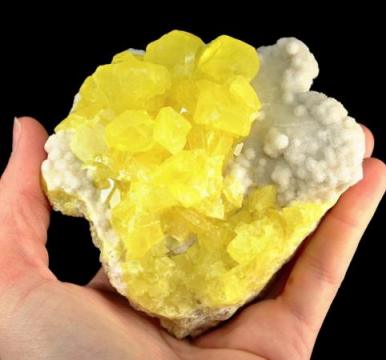 (b)
(b)
& Toykuni III,
Kuniyoshi,
Toyokuni II,
 A (b) means as a
A (b) means as a
book illustrator sometimes
along with woodblock prints. |
|
Andreas Marks gives
the dates as ca. 1823
to 1864.  As of 11.18.20
As of 11.18.20
this is the only carver
we have found for this
publisher. |
|
Horikō Fusajirō worked as
a
carver for this house on
Kuniyoshi prints in the
mid-1840s. |
|
|
|
|
|
|
|
|
Iseya Kanekichi
(Seal name - Isekane
伊勢兼)
(cf. Kichi listed below)
Marks #145 |
伊勢屋
兼吉 |
いせやかねきち |
Edo/Tokyo |
 |

Andreas Marks notes that this particular
seal was used between 1850s-71.
Marks seal
#21-059 |
|
Gengyō, Hiroshige,
Hiroshige II,
Hiroshige III,
Kunichika,
Kunihisa II,
Kunisada II,
Kuniteru,
Kuniteru II,
Kuniyoshi,
Kyōsai,
Sadahide,
Shigeharu,
Shigetsugu,
Toyokuni III,
Yoshikazu, Yoshitora,
Yoshitsuya, Yoshitoshi |
|
Andreas Marks gives
the dates as the late 1840s
to ca. 1875 |
|
Hori Take carved
for this house from 1852-59;
 Hori Masa in 1861 and 1863.
Hori Masa in 1861 and 1863. |
|
|
|
|
|
|
|
|
Iseya Kisaburō
(Seal name - Iseki 伊勢喜
Originally thought to be
Ise-ya Kanekichisaburō. |
伊勢屋
喜三郎 |
いせや
きさぶろう |
Edo/Tokyo
The print shown to
the right is not one we have offered. The image has been
sent to us from the Eikei (英渓) Collection. We are grateful for this
contribution to our site. |
 |
 |
|
Chikanobu,
Hiroshige III,
Kunichika,
Kunitarō,
Kunitoshi,
Yoshitora,
Yoshitoshi
|
|
Andreas Marks gives
the dates of 1865
to ca. 1898
|
|
|
|
|
|
|
|
|
Iseya Rihei
(Seal name -
Iseri 伊勢利;
firm name - Kinjudō
錦樹堂;
family name - Yamamoto Rihei
山本利兵衛)
Marks #152 |
伊勢屋
利兵衛 |
いせや
りへえ |
Edo/Tokyo |
   |
 |
|
Chikanobu, Eisen, Eizan, Hiroshige, Hokusai,
Kunichika,
Kunisada,
Kuniyasu,
Kuniyoshi, Sadakage,
Shuntei, Toyokuni I,
Toyokuni II, Utamaro,
Yoshiiku,
Yoshimori,
Yoshitora, Yoshitoshi |
|
Andreas Marks gives the
dates 1790s to ca. 1879 |
|
|
|
|
|
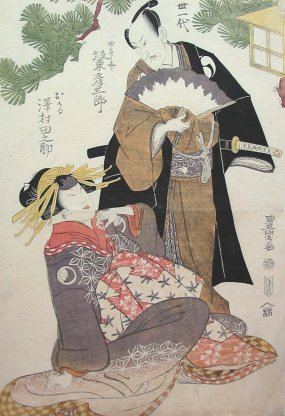 |

Marks seal
#01-122
Andreas Marks notes that this particular
seal was used between 1810s-67. |
|
|
|
|
|
 |
 |
|
|
|
|
|
|
|
|
Iseya Sanjirō
(Seal name - Isesan 伊勢三,
firm name - Eijudō 栄樹堂)
Marks #153 |
伊勢屋
三次郎 |
いせや
さんじろう |
Edo
The print shown to
the right is not one we have offered. However, it has a publisher's
seal which we want to display for your information. The image has been
sent to us from the Eikei (英渓) Collection. We are grateful for this
contribution to our site. |
 |

CORRECTION:
This exact seal does
not appear in Marks. |
|
Hokusai,
Kunisada,
Kuniyoshi, Sadatora |
|
Andreas Marks gives
the dates of ca. 1823
to 4th Month, 1852 |
|
|
|
|
|
|
|
|
Iseya Shōnosuke
(Seal name - Isesho 伊勢庄,
firm names - Shōgyokudō 松延堂
and Shōgyokudō 松玉堂)
Marks #155 |
伊勢屋
庄之助 |
いせや
しょうのすけ |
Edo/Tokyo |
 |

Marks seal
#22-231
Marks notes that this seal
was used in the 1860s. |
|
Keinen, Kunichika,
Kunisada III,
Sadahide, Toyokuni III,
Yoshiiku,
Yoshimasa, Yoshimori,
Yoshitora, Yoshitsuya |
|
Andreas Marks gives
the dates of ca. 1848
to 1882 |
|
|
|
Iseya Sōemon
(Seal name - Isesō 伊勢惣
firm name - Taieidō 大栄堂)
Marks #156
|
伊勢屋
惣右衛門 |
いせや
そうえもん
|
Edo
The print shown to
the right is from the Lyon Collection.
Click on it to
learn more. |

|

Marks seal
#21-146
Marks notes that
this seal was
used in 1845.
|
|
 Eisen,
Eisen,
Eizan,
Hidemaro,
Hiroshige,
Hisanobu, Kiyonaga,
Kunisada, Kunisada II,
Kuniyoshi, Shuntei,
Toyokuni I, Utamaro |
|
Andreas Marks gives
the dates of ca. 1776
to XI/1862.
|
|
|
|
|
The Hiroshige fan
print shown
to the right
is in the
collection of the
Museum of Fine Arts,
Boston. |
 |

Marks seal
#19-047
Marks notes that
this seal was
used in 1850-65.
|
|
|
|
|
The Eisen fan
print shown
to the right
is in the
collection of the
Brooklyn Museum.
Henry Smith II
believes
it was the first use
of
Prussian blue on a
nishiki-e in 1829. |
 |


Marks seal
#02-041
Marks notes that
this seal was
used from 1776
to 1850.
|
|
|
|
|
|
|
|
|
Iseya
Tōkichi
(Seal names - Isetō 伊勢藤 &
Daikyōdō 大喬堂)
Marks #158
|
伊勢屋
藤吉 |
いせや
とうきち |
Edo
The print shown to the right is not
one we have offered. However, it has a publisher's seal which we want to
display for your information. The image has been sent to us by M.B. We are grateful for this contribution to our site. |
 |

Marks seal
#22-232
Andreas Marks notes that this particular
seal was used in 1863. |
|
Ikumaru,
Kunichika,
Kunitaka, Kuniteru II,
Kunitomi, Kunitsuru,
Sadahide & Toyokuni III,
Yoshifuji,
Yoshiharu, Yoshiiku,
Yoshikata |
|
As early as 1840 or earlier
to as late as 1865 or later
Andreas Marks gives
the dates of 9th Month, 1862
to
ca. 1868 |
|
Hori Mino worked
for this house in 1863. |
|
|
|
|
|
|
|
|
|
|
|
|
|
|
|
Ise Yoshi
Marks #U095 |
伊勢芳 |
いせ.よし |
Edo |

There is no longer a link to this print. |

Marks seal
#25-013
Marks gives
the dates of ca. 1855-60 for this seal.
|
|
Kuniyoshi, Toyokuni III,
Yoshikazu, Yositora |
|
Andreas Marks gives
the dates of ca. 1855-60
|
|
Hori Take worked for this
house in 1855 carving a
Toyokuni III print.
Hori Shōji also worked
for this
house in 1855
carving aKuniyoshi print.
|
|
|
|
|
|
|
|
|
Ishikawaya Wasuke
(Seal name -
Ishiwa 石和:
firm name - Saiundō
さいうん堂)
Marks #163 |
石川屋和助 |
いしかわや
わすけ |
Osaka
The Kunikazu print
to the right is from
the Lyon Collection.
To see more about
it
click on it. |

|

Marks seal
#25-343
Marks gives
the dates of 1859-61 for this seal.
|
|
Enjaku, Gyokuen,
Kunikazu,
Sadanobu II, Shunsui,
Tokyō, Yoshimine,
Yoshimitsu, Yositaki,
Yoshitoyo, Yoshiyuki |
|
Andreas Marks gives
the dates of ca. 1842-1911
|
|
|
|
|
|
|
|
|
Itoya Fukujirō
(Seal name - Kyōya 京屋:
firm name - Shinshōdō
新庄堂)
Marks #166 |
糸屋福次郎
|
いとやふくじろう
|
Edo |
 |

Marks
seal 25-244
Marks notes that this seal was
used in 1859. |
|
Kunichika,
Yoshimori,
Yoshimune,
Yoshitora
|
|
Ca. 1856 to 1861 |
The carver Hori Shōji
worked for this
publisher on a
Yoshitora in 1859. |
|
|
|
|
|
|
|
|
Itoya Shōbei
(Firm name - Itoshō 糸庄)
Marks #167 |
糸屋
庄兵衛 |
いとや
しょうべい |
Edo |
 |

Marks
seal 24-041
Andreas Marks notes that this particular
seal was used between 1860-63. |
|
Hiroshige II, Kunitsuna,
Sadahide,
Toyokuni III,
Yoshimune,
|
|
Ca. 6th Month, 1847 to 1865 |
|
|
|
|
|
|
|
|
|
|
|
|
|
|
|
Itōya Yohei
(Firm name - Eiseidō
英盛堂)
Marks #168 |
伊藤屋
与兵衛 |
いとうや
ょへえ |
Edo |
 |

Marks
seal 01-061 |
|
Eisen (
 b),
b),
 Hiroshige (b),
Hiroshige (b),
Kunikane,
Kunisada (
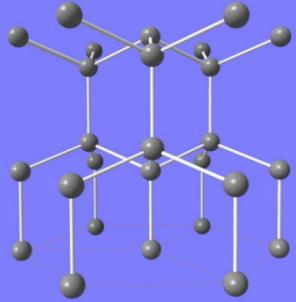 b),
b),
 Kuniyasu (b),
Kuniyasu (b),
Kuniyoshi,
Shuntei
Toyokuni I,
 Yoshimaru (b),
Yoshimaru (b),
Yoshitora
 A (b) means as a
A (b) means as a
book illustrator sometimes
along with woodblock prints. |
|
Andreas Marks gives
the dates of ca. 1806-30s,
but there is a
Kuniyoshi print at the
Museum of Fine Arts
in Boston dating from
1850.
|
|
|
|
|
|
|
|
|
Iwatoya Kisaburō
(Seal name - Iwa
岩:
firm name
- Eirindō
栄林堂)
Marks #173 |
岩戸屋
喜三郎 |
いわとや
きさぶろう |
Edo
The print shown to the right is not
one we have offered. However, it has a publisher's seal which we want to
display for your information. The image has been sent to us from ED. We are grateful for this contribution to our site. |
 |

Marks
seal 08-051
Andreas Marks notes that this particular
seal was used between 1760s-1820s. |
|
Chōki (
 b), Eiri,
b), Eiri,
Eisen (
 b), Eishi,
b), Eishi,
Eishō,
Eizan,
Enshi,
Hiroshige (  b),
b),
Hisanobu,
Hokusai (
 b),
b),
Kiyomitsu,
Kuniharu,
 Kunimaru (b),
Kunimaru (b),
 Kuninobu (b),
Kuninobu (b),
Kunisada (
 b),
b),
Kuniyasu (
 b),
b),
 Sadafusa (b),
Sadafusa (b),
 Sadakage (b)
Sadakage (b)
Shigemasa,
Shigenaga (
 b),
b),
Shunchō,
 Shundō (b),
Shundō (b),
Shun'ei,
Shunkō II
(Shunsen
 b),
b),
Shuntei (
 b),
b),
Toyoharu,
Toyomaru,
Toyokuni I,
Toyokuni II (
 b),
b),
Tsukimaro, Utamaro,
Utamaro II,
 Yoshimaru (b)
Yoshimaru (b)
 A (b) means as a
A (b) means as a
book illustrator sometimes
along with woodblock prints. |
|
Andreas Marks says
that this publisher was
active from the 1760s to 1832. |
|
The Museum für angewandte
Kunst in Vienna gives the dates of ca. 1744-1844 for this publisher |
|
According to Andreas Marks in his Japanese Woodblock Prints: Artists, Publishers and Masterworks 1680-1900
(p. 202) this publisher joined the Picture Book and Print Publishers Guild
in 1807 and the Book Publishers Guild in 1812. "From 1811 until 1815 he was
active as a censor of prints."Marks adds important information about Iwato-ya
role in the early development of Hiroshige: "In the late 1810s, when the
young and unknown Hiroshige started to design woodblock prints, he found in
Iwatoya Kisaburō an established publisher who supported him and took on the
risk to issue his designs. Hiroshige, being Toyhiro's student, might have
been introduced to Iwatoya from his teacher who had illustrated for him at
least four books during the 1800s. Until c. 1822, Hiroshige designed series
of beautiful women for Iwatoya and, from time to time, was also commissioned
to illustrate books. None of these works reached great fame but they prove
that Hiroshige tried for over ten years to find his own subject matter and
it is to Iwatoya's credit to have employed Hiroshige despite the fact that
his works did not receive that much attention." Marks is also definitive
about the end date for this publisher: "The last known publication is an
actor print from early 1832. It is a memorial print by Utagawa Kuniharu
(1807-1839) of the actors Segawa Kikunojō V and Bandō Mitsugorō III
(1775-1832) who both passed away in early 1832."
|
|
|
|
|
The Kunisada print
to the
right is from the
Lyon Collection.
Click on the image
to learn more. |
 |
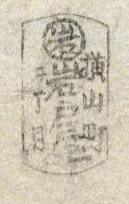
Marks
seal 23-018
Andreas Marks notes that this particular
seal was used in the
1820s. |
|
|
|
|
|
|
|
|
|
|
|
|
|
|
|
Izumiya Ichibei
(Seal name - Sen'ichi 泉市;
firm name - Kansendō 甘泉堂; family name - Yamanaka Ichibei 山中市兵衛)
Marks #180 |
和泉屋
市兵衛 |
いずみや
いちべ え
|
Edo / Tokyo |
_small.jpg) |

Marks
seal 21-237
Andreas Marks notes that this particular
seal was used in 1853. |
|
Eiri, Eisen
(
 b), b),
Eishi, Eishō,
Eizan, Hiroshige,
Hiroshige II,
Hiroshige III,
Hokusai,
Kazan,
Kiyonaga,
Kuninaga,
Kunimitsu I,
as Kunisada & Toyokuni III,
Kunisada II, Kunisato,
Kuniteru,
Kuniteru II,
Kunitomi,
 Kuniyasu
(b), Kuniyasu
(b),
Kuniyoshi
(
 b), b),
Kyōsai,
Masanobu
(
 b), b),
Masayoshi,
Sadahide,
Senchō  (b),
(b),
 Shigemasa (b), Shigemasa (b),
Shigenaga (
 b), b),
Shunchō,
Shunkō II
(Shunsen
 b), b),
Shuntei (
 b), b),
Toyoharu,
Toyohiro (
 b), b),
Toyokiyo,
Toyokuni I,
Toyokuni II (
 b), b),
Utamaro
(
 b), b),
Utamaro II,
Yoshifuji,
Yoshifusa,
Yoshiiku,
Yoshikazu, Yoshitora
Yoshitori-jo
 A (b) means as a
A (b) means as a
book illustrator sometimes
along with woodblock prints. |
|
Peter Kornicki in his The Book in Japan: A Cultural History from the
Beginnings to the Nineteenth Century (p. 172) says that this publisher
"...was active over several generations from the end of the seventeenth
century to the late nineteenth century..."
Andrea Marks gives us a more accurate dating for the lifespan of this firm:
Ca. 1686 to 1886 |
|
Andrea Marks says: "With several hundred prints Izumiya Ichibei is among the
most successful and productive publishers in the history of Japanese
woodblock prints. As early as 1686, Izumiya was active as a publisher but
his first prints date from around 1776, ninety years later." Marks gives of
some of the dates of the various holders of the house name: Ichibei I died
in 1730; Ichibei II in 1753; #3 in 1781; #4 in 1823 and #5 in 1826.

"In the book 'Gathering of Views of Famous
Sights along the Tōkaidō' (Tōkaidō meisho zue) from 1797
is an illustration of Izumiya's shop,
located directly next to fellow publisher Masuya."
"In 1790, Izumiya was a founding member of
the Picture Book and Print Publishers Guild (Jihon toiya) and was
still listed as a member in 1807 and in 1851 as a member of the Old Faction
(Motogumi) of the guild. In the ninth month of 1820 he is also a
founding member of the Book Publishers Guild (Shomotsu toiya) and in
1851 a member of the Nakadōri Faction (Nakadōrigumi) of this guild."
In 1812 and 1813 he functioned as a censor. Dr. Marks ends his text entry on
this publisher with this: "Following the new rules, Izumiya Ichibei signed
as Yamanaka Ichibei since 1876. The last known publications date to 1886,
indicating that the publishing firm ceased to exist after being in business
for 200 years." Source and quotes from Japanese Woodblock Prints: Artists, Publishers and Masterworks 1680-1900
(p. 208). |
|
|
|
|
The Utamaro print
shown to the right
is
from the Lyon
Collection.
Click on it to see
more information. |
 |

Marks seal #25-365
Marks notes that this particular seal was used from the 1780s until the
first decade of the 19th century.
 We
know that this appears on prints designed by Utamaro and Toyokuni I. We
know that this appears on prints designed by Utamaro and Toyokuni I. |
|
|
|
|
The seal on this
print is
particularly curious. The
outside lines create a
mock Genji-mon motif.
This seal may only appear
on this Rutstic Genji
series.
Click on it to see
more information. |
 |
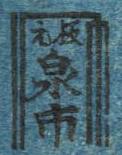
Marks seal #24-056
Andreas Marks notes that this particular
seal was used in the 1850s. |
|
|
|
|
The print to the
left was
designed by Toyokuni
III
and is the center
panel of
a triptych. |
 |

Marks seal #30-039
Marks notes that this particular seal was
used between
1855 and 1860. |
|
|
|
|
|
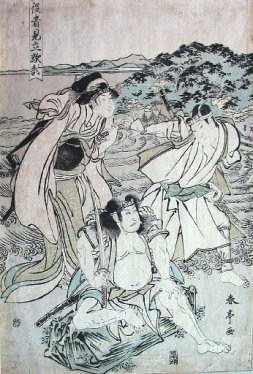 |

This seal is not
in Marks. |
|
|
|
|
|
 |

Andreas Marks notes that this particular
seal was used in the 1830s,
 but
it appears on the Eisen to the left from 1826-28. but
it appears on the Eisen to the left from 1826-28.
Marks seal #25-363
 We
have found this seal on prints by Eisen, Shunsen (as early as 1811)
and Kuniyoshi. We
have found this seal on prints by Eisen, Shunsen (as early as 1811)
and Kuniyoshi. |
|
|
|
|
|
|
|
|
Izumi Katsujirō
Marks #176
|
和泉勝次郎 |
いずみや
かつじろう |
Tokyo
The Kunimaru II to
the
right is from a
triptych
in the Lyon
Collection.
Click on it to see
the whole composition. |
 |

This seal is not
in Marks.
|
|
Ikukatsu,
Kunimaru II,
Kuniyoshi
(posthumously printed) |
|
Marks gives the dates
as ca. 1891, but
we know of a print
from 1886. |
|
|
|
|
|
|
|
|
Izutsuya Denbei
(Seal name - Iden - 井伝)
Marks #186
|
井筒屋
伝兵衞 |
いづつや
でんべえ |
Osaka
To see a full but
different
example of the
complete
Hokushū triptych at the
Museum of Fine Arts
in Boston then click
on the image to the
right. |
 |

Marks seal
#07-030
Andreas Marks notes that this particular
seal was used between 1822-35. |
|
Ashiyuki, Chikakuni,
Ganjōsai,
Hidekuni,
Hikokuni,
Hokuei, Hokuho,
Hokumei, Hokushū,
Kiyokuni, Kunihiro, Sadakazu,
Shibakuni,
Shuncho,
Shunju,
Shunkō,
Tamikuni,
Toshikuni,
Umeharu, Umekuni, Yoshikuni, Yoshiyuki |
|
Marks gives the dates
as ca. 1822-35. |
|
Izutsuya Denbei's seal
appeared along with that of Tenmaya Kihei on a
Yoshikuni diptych in 1825. |
|
|
|
|
|
|
|
|
Izuya Sankichi
(Seal name - Izusan 伊豆三
Marks #189 |
伊豆屋三吉 |
いずや
さんきち |
Edo/Tokyo |
 |

Marks seal
#22-016
Andreas Marks notes that this seal was used
in 1852. |
|
Kuniyoshi,
Shigekiyo,
Toyokuni III |
|
Andreas Marks gives the dates ca. 1850-74 for this publisher. |
|
The carver Hori Mino worked
for this house in 1851. |
|
Robinson spells this as Idzu-San. |
|
|
|
|
|
|
|
|
Izutsuya
Shōkichi
Marks #188 |
井筒屋
庄吉 |
いづつや
しょうきち |
Edo
|

To learn more about this print
from
the Lyon Collection
click on the image above.
|

Marks seal #21-060
Andreas Marks notes that this particular
seal was used between the 3rd Month, 1852 to 1855.
|
|
Hiroshige,
Kunichika, Kunifuku,
Kunisada, Kuniyasu,
Kuniyoshi,
Sadahide,
Yoshifuji, Yoshitora |
|
Andreas Marks gives
the dates ca. 1849-65 for this publisher |
|
Hori Take carved
for this house in 1852 and 1863.
Hori Shōji
worked for this
publisher on a Kuniyoshi
in 1855. Hori Ei worked
on a Kunichika in 1865;
Hori Takichi on a
Toyokuni III triptych in
1853. Hori Mino on
a Toyokuni III in 1853;
Hori Chō on a
Toyokuni III in 1861;
 Hori Masa in 1861.
Hori Masa in 1861. |
|
|
|
|
The Kuniyoshi print
shown to the right
is from the collection
of
the Museum of Fine
Arts,
Boston.
|
 |

Marks seal #01-054
Marks says that this
seal was used between
1849 and IV/1852. |
|
|
|
|
|
 |
.jpg)
Marks seal #24-055
Marks says that this
seal was used between
XII/1852 and 1865. |
|
|
|
|
|
|
|
|
Jōshūya Jūzō
Marks #191 |
上州屋
重蔵 |
じょうしゅうや
じゅうぞう |
Edo/Tokyo
The print shown to
the right is not one we have offered. It has been contributed to this
site by K. S. of Germany. For this we are grateful. |
 |

Marks seal #01-065
Andreas Marks notes that this particular
seal was used between 1812-60s. |
|
Hiroshige II,
Hōshō,
Kiyomitsu II,
Kunichika,
as both Kunisada & Toyokuni III,
Kunisada II,
Kunisada III,
Kuniteru,
Kuniyasu, Kuniyoshi
Kyōsai,
Sadafusa,
Shuntei,
Toyokuni I,
Yoshiiku,
Yoshimune,
Yoshitomi, Yoshitsuya |
|
Andrea Marks gives the
dates for this publishing
firm as ca. 1812 to 1876. |
|
The carver
Hori Mino worked
for this house in 1850
and 1853. Hori Shōji
worked for this
publisher on a
Kuniyoshi in 1852 and
a Kuniteru in 1855. |
|
"There has been some confusion with the publisher's first name being Jūzō or
Jūbei, as the seals that Jōshūya mostly used do not tell that information.
One source tells us that Jūzō inherited the business in the second month of
1862 from his father Jūbei [兵衛] and Jūzō's son was Jūshichi. Another
source says that in the ninth month of 1863 the son Chiyomatsu inherited the
business and took the name Jūzō. However, an inheritance in 1862/63 by Jūzō
is contradicted by the name Jūzō appearing on some prints from the 1830s and
1840s as well as being listed in the Guild members from 1851. In fact, it
was Jūbei who inherited the business from Jūzō as a game board by Hiroshige
II exists... with his name on it. Unfortunately a date for this game board
could not be verified." Source and quotes from Japanese Woodblock Prints: Artists, Publishers and Masterworks 1680-1900
by Andreas Marks, p. 256.
There are Hiroshige prints in the Museum of Fine Arts in Boston published by
Jōshūya Jūzō that were originally published by Tsutaya Kichizō. Jōshuya Jūzō collaborated with Tsuruya Kiemon
and Nishimuraya Yohachi on a Hokusai suguroku print in the 1820s. |
|
|
|
|
|
This seal was used on
a Toyokuni III print
in 1843-5
|

Marks seal #23-039
Andreas Marks notes that this particular
seal was used between 1844-45. |
|
|
|
|
|
|
|
|
Jōshūya Kinzō
(Seal name - Jōkin 上金;
firm name - Shōfukudō
祥福堂;
family name -
Ōsawa Kinzō 大沢金蔵)
Marks #192 |
上州屋
金蔵 |
じょうしゅうや
きんぞう |
Edo/Tokyo |
 |
 |
|
Chikamaro,
Eisen,
Fusatane,
Gengyo,
Hiroshige,
Hiroshige II,
Kuniaki,
Kunichika,
Kunihisa II,
as both Kunisada & Toyokuni III,
Kunisada II,
Kuniteru, Kuniyoshi,
Kyōsai,
Sadakage,
Sadashige,
Shunpūsha,
Toyokuni II,
Yoshifuji
Yoshiiku,
Yoshikatsu,
Yoshikazu,
Yoshimori,
Yoshiono,
Yoshitora, Yoshitori-jo,
Yoshiume |
|
Andreas Marks gives
the dates ca. 1837-72 for this publisher |
|
Horikō Fusajirō worked as
a
carver for this house on
Kuniyoshi prints in the
1845. |
|
|
|
|
The Kuniyoshi print
shown to the right
is
from the Lyon
Collection.
Click on it to see
more information. |
 |

Marks seal #22-057
|
|
|
|
|
|
To the right is an alternative
seal for Jōshū-ya Kinzō. |

Marks seal #25-293
Andreas Marks notes that this particular
seal was used between 1860-64. |
|
|
|
|
|
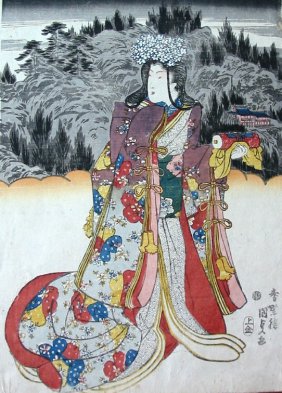 |

Marks seal #25-293(?)
Andreas Marks notes that this particular
seal was used between 1841-64.
|
|
|
|
|
|
|
|
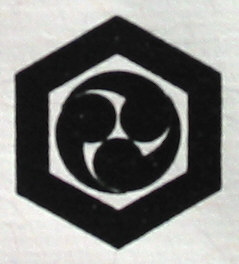
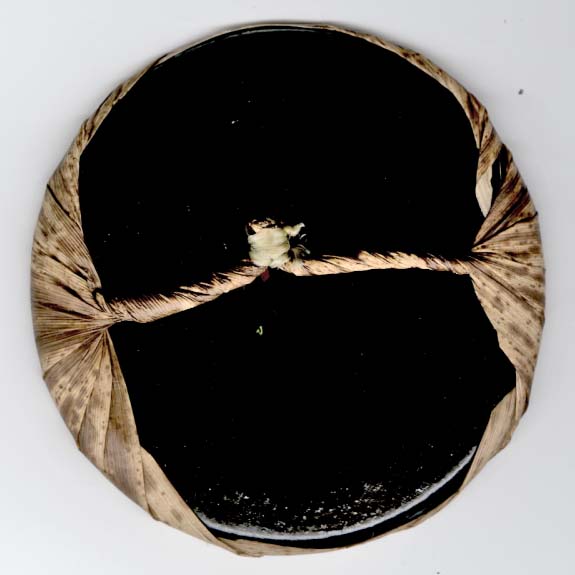
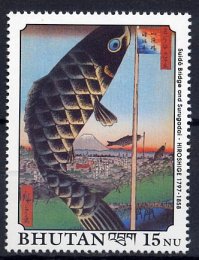
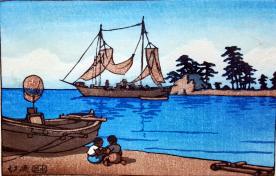
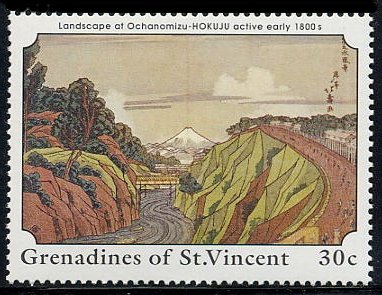
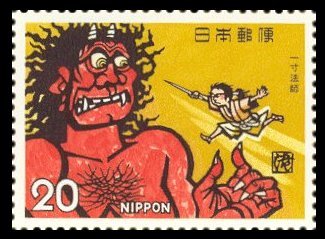
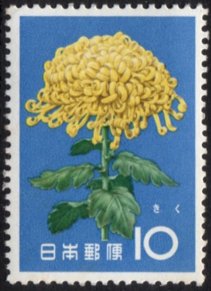
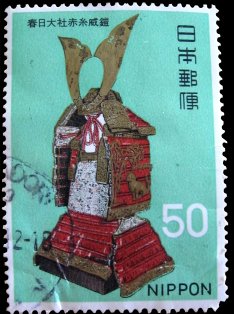
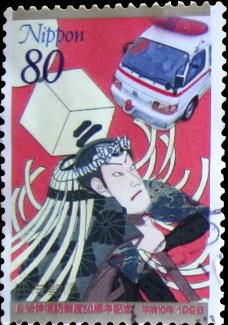
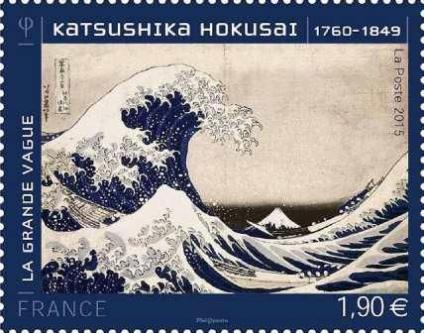








































_small.jpg)






















.jpg)







